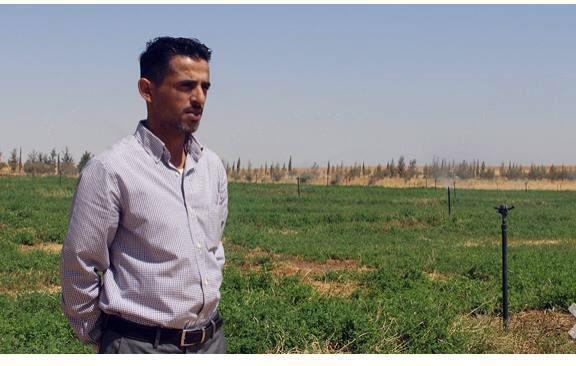
India- Biosaline agriculture helps pioneering farmers overcome challenges of irrigation with treated sewage water
Jordanians who rely on farming and grazing cattle for a living are doubly affected by it, as it drives soil and water salinity (salt concentration) levels through the roof.
Needless to say, this harms crops and affects the yield of farming plots, especially in the more arid regions of Jordan, which are also more affected by the change in climate than other parts of the country.Farmers there already find trouble supplying their plots with water, as it is for the countless who reside in these areas, like 30-year-old Mohammad Al Fayaz, who until recently was faced with the same problem.
After years of law school, Fayez decided to take on farming, alongside his father and brother on their land.In part, Fayez is driven by the endeavour to maintain the green in their village, Umm Rummaneh, in the Jiza District, south of Amman.
But, 'farming is the main source of income' for Fayez and his family, he told The Jordan Times.'The university degree, which my father made sure that my siblings and I earned, was meant as a means of security —a backup plan if you will— that may come in handy some day,' he added.
'My village, Umm Rummaneh, is the only village in Jiza that has no natural reservoirs of groundwater. We drilled three wells, but to no avail,' he said. That was more than 10 years ago, he noted.But failure did not mean the end for Fayez and family.
'Failure at one thing could mean the start of a more successful venture,' he said.And his father's love for land had not changed, despite the challenges and the lack of access to groundwater.
Determined to work the land, 'we shifted our attention to the 'Jiza historic pool' to get water and irrigate dozens of dunums of peach and apricot crops', he explained.'My father suggested to the village leaders that we make use of the pool to irrigate 30 dunums of fruit trees, especially since it usually floods with rainwater. In fact, it was becoming a health and environmental hazard [the pool of stagnant water],' Fayez underscored.
For 10 years, farmers in the village used the pool water for irrigation, he said, that is, until they ran into trouble with the Greater Amman Municipality.As a result, the farmers were no longer able to get the water from the pool, which put them in a difficult situation.
The land became arid once again, after the 30-dunum plot was cleared of trees, Fayez continued.'Early in 2016, with the implementation of the water treatment station project near Al Jizah, we learned that we can use the water coming from the station,' he said.
It was at the workshop organised by the International Centre for Biosaline Agriculture, in cooperation with the National Centre for Research and Agricultural Guidance, that Fayez was introduced to the concept of biosaline agriculture, a technique that helps overcome high soil and water salinity challenges.It relies on growing salt-tolerant crops and fodder, which in Fayez's case was imperative to the process, as his crops were irrigated with water from the station — treated water.
'We drew a 14-kilometre pipeline from the station, to a 5-dunum agricultural pool in our land,' he said.Treated waste and sewage water poses no harm to the environment or the people, and can be used for the irrigation of certain crops, mainly fodder.
However, growing fodder crops with a reliance on the station's supply of water required a different technique, and this is where biosaline farming comes in.Armed with the new biosaline agricultural technique on one hand, and the water from the station on the other, Fayez and his family ended up sowing 100 dunums, instead of just their own 30.
Now, the challenge was to preserve the land's ownership and ensure fodder self-sufficiency for the family's cattle.This was the third harvest season of fodder grown on treated water, using biosaline techniques.
'Our fodder, including alfalfa, oats, corn and herbs, has landed in the silos and is ready to be sold in the local market,' he said, 'and the returns of the venture are promising'.As a result of their success, other farmers in the village are preparing their lands for fodder crops, with a reliance on the station's treated water.
It worked, Fayez said.The harvest was increased and the land is cultivated throughout most of the year, he continued.
At the same time, it also changed the ideas about using treated water for irrigation, he highlighted.Meanwhile, this project, which is part of the Bayt Al Khair Society's efforts to support fodder farming, had other holistic societal implications — positive ones.
It led to infrastructural improvements throughout the village, as new roads were opened for farmers to easily access their lands, and it drove the expansion of the power grid in the area to include newly chartered areas.More so, treated water irrigation is becoming more popular with every success, as farmers in nearby villages begin to learn from their neighbours.
'I have taken a chance on using biosaline agriculture to grow fodder crops on treated water; I invested hundreds of thousands of dinars in this, and it paid off,' Fayez concluded.'There is no life without adventure, and I knew where this one would take me.'

Legal Disclaimer:
MENAFN provides the
information “as is” without warranty of any kind. We do not accept
any responsibility or liability for the accuracy, content, images,
videos, licenses, completeness, legality, or reliability of the information
contained in this article. If you have any complaints or copyright
issues related to this article, kindly contact the provider above.


















Comments
No comment